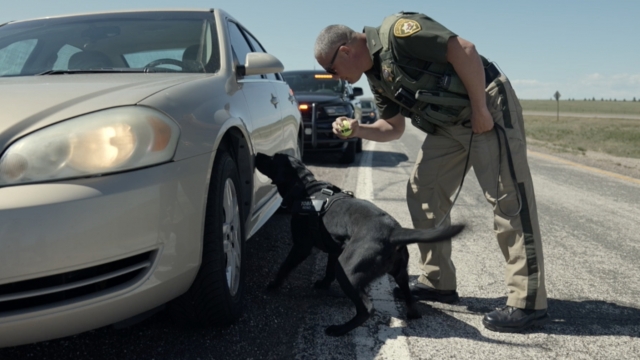At first glance, most see a cute labrador when they look at Reno, but the minute she starts working it's clear this K-9 means serious business.
"That particular odor right there when it was on that side of the vehicle, she picked it up back here did you see that?" said Joseph Dellos, a Wyoming Highway Patrol trooper who is also Reno's handler.
Dellos is talking about fentanyl. It took the dog just seconds to sniff out the scent on the side of this highway in Cheyenne during a demonstration.
"Aside from marijuana, other drugs like fentanyl, I would not be able to smell it at all in the vehicle," Dellos said. "I mean she's got such a phenomenal nose on her you know, she smells the things we can't smell."
Reno was the first narcotic detection canine with the Highway Patrol to be trained on fentanyl. They are the first agency in the country with nationally certified fentanyl-detecting K-9s. Lieutenant Joshua Hardee helped create this training program.
SEE MORE: Fentanyl laced with animal tranquilizer 'emerging threat' in US
"Our agency partnered with McCore K-9 out of California and we got together and were like we're going to train this dog. This is how we're going to do it," Hardee said.
It's something departments had strayed away from because of how dangerous the drug can be, but Hardee knows what it feels like for this drug to take a loved one, both professionally and personally.
"My wife's little brother, he died from an overdose that had fentanyl in it so it's impacted our family and sure that's impacted me as well and part of my passion for doing this," Hardee said.
Fentanyl is up to 50x stronger than heroin and 100x stronger than morphine. A few grains of sand worth can be lethal. According to the CDC, over 150 people die every day from overdoses related to synthetic opioids like fentanyl. It's a lethal drug that's driving a rapid rise in these deaths.
SEE MORE: Biden administration offers support for GOP-led fentanyl bill
"Many agencies, officers, K-9 trainers, didn't want to mess with fentanyl because it was so dangerous. The thought was if there was a pill across the room and you even got remotely near it, it was going to cause you problems and you might overdose," Hardee said.
Fentanyl is involved in more American youth drug deaths than heroin, meth, cocaine, benzos and other prescription drugs combined. The question was, how do they train these dogs without hurting them? Through research and partnership, the answer became clear: Carefully.
"It's based upon those containers that they are in. One is just basically a trace odor and one is a real odor, but no particles or anything come out of that container," Hardee said.
The filtration system in these new products allows the dogs to do their jobs without any harm. When they are out in the real world, they are trained to keep their distance while using the strength of their nose.
SEE MORE: Fentanyl test strips can save lives, but they're not legal everywhere
"Keeping them on the exterior of the car, not letting them kind of go in and after and claw and bite at things," Hardee said. "Them being trained and knowing and being more cautious about how they search things is definitely a priority now."
Experts say much of the fentanyl in the United States is made by Mexican drug cartels from materials imported from China. For the U.S., it's a national public health crisis.
"We're not going to sit back and watch people in our communities die," Hardee said. "Already what's been taken off the streets has saved lives."
Hardee says these dogs are a major tool in their tool box, to find, identify and eliminate the drug from different communities.
"The courts recognize the dogs as being a valuable tool and an accurate tool," Hardee said. "This is a pioneering effort on our part. It's new to the entire country."
Implementing this training is one way law enforcement agencies across the country can prevent fentanyl from killing more people.
"I've talked to hundreds of people. I get calls weekly about how we did this and how we did this safely," Hardee said. "We're making great strides in training our dogs on fentanyl and I'd like to see other departments do the same," Dellos said.
Trending stories at Scrippsnews.com




